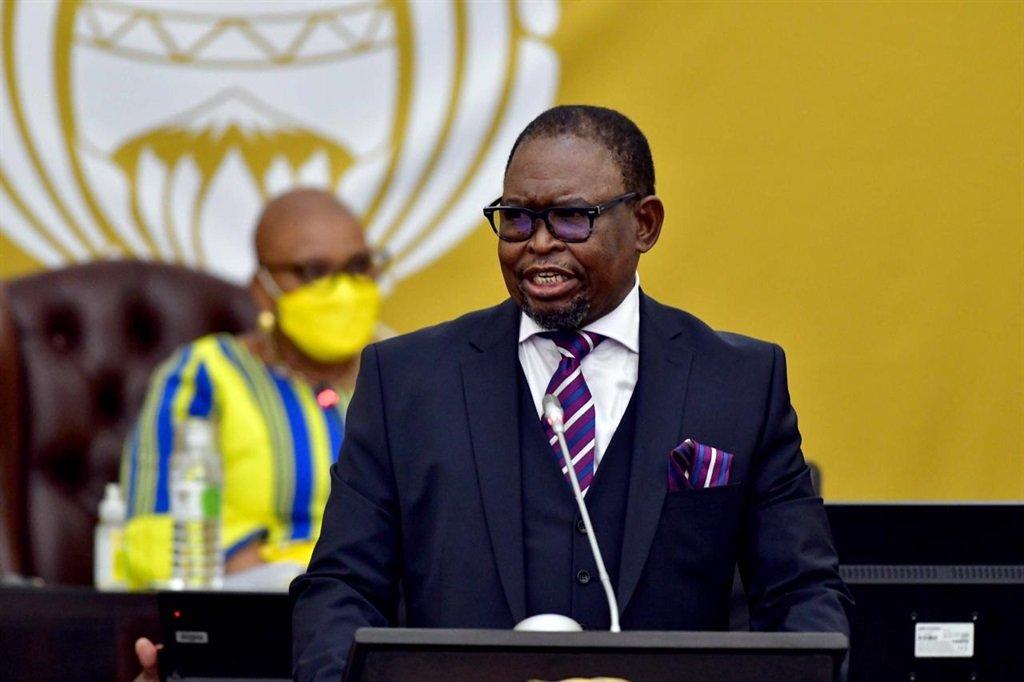Africa-Press – South-Africa. The lack of a “credible action plan” to resolve issues at Ubank, despite being given enough time, and lack of alignment between its board and ownership trustees, accelerated the need for it to be placed under curatorship, according to Finance Minister Enoch Godongwana.
While tabling the budget vote for the National Treasury during a plenary of Parliament on Wednesday afternoon, Godongwana said that the SA Reserve Bank’s intervention was aimed at saving the troubled bank, not closing it down.
On Monday Reserve Bank governor Lesetja Kganyago announced that Ubank had been put under curatorship, as its the capital adequacy ratio had dipped to 3%, down from 23% in 2020. The ratio is below the minimum regulatory requirement set for the bank. It’s lack of corporate internal controls also presented risks for its 4.7 million accounts, many of which are for mineworkers and their families.
“I have been dealing with the concerns of the Prudential Authority (PA) that Ubank’s capital adequacy levels have been deteriorating over the last 18 months, and the inability of the board and its shareholders to adopt and implement an action plan to reverse this decline,” Godongwana said.
He said meetings had been happening with previous finance ministers, and since March this year “intensified” to weekly meetings, before finally culminating in daily ones over the past week.
“This intensification was triggered by Ubank’s capitalisation falling below minimum regulatory requirements. The PA’s engagement with the Board over the last months and weeks has, despite providing them with more time to respond satisfactorily with a credible action plan, resulted in a lack of alignment between the Board and its ownership trustees, and accelerated the need, and timing, of the curatorship.”
State capture, lack of political will stalled progress on transformation: Godongwana
Godongwana said a recommendation of the PA CEO, deputy Reserve Bank governor Fundi Tshazibana, prompted him to deem it necessary and “in the public interest” to approve that Ubank be placed under curatorship.
“Curatorship is a mechanism to provide regulators additional tools to save the bank, not to close it, and as such, curatorship will assist in preserving depositor funds that are held by the institution and will allow for its resolution to be done in a controlled and structured manner,” Godongwana said.
Ubank, formerly known as Teba Bank, is owned by the Teba Fund Trust which is administered by National Union of Mineworkers (NUM) and the Minerals Council of SA, with three trustees each. Neither the council nor NUM has a stake or financial interest in Ubank. The beneficiaries of the trust are the bank’s customers.
The NUM said on Monday it was “highly shocked and surprised” by the announcement. “This happened despite the Ubank’s board commitment [on Sunday] night that it will raise the required R800 million to save the bank from being placed under curatorship,” the union said in a statement.
“The Ubank board managed to raise the required money and the NUM is shocked by this latest development.”
But the Minerals Council South Africa said it supported the action taken to place Ubank under curatorship because it will clear the way to stabilise Ubank, protect depositors and enable the attraction of a long-term investor for the bank.
The council said that several attempts were made by the Trust and Board to secure an investor for the bank.
“Unfortunately, the most recent attempt to secure such a strategic investor fell through in late 2021, even after approval by the Prudential Authority. This year-long process, which collapsed through no fault of the trustees, pushed Ubank into the position that it now finds itself in,” the council said.
A boost for SARS
Godongwana mentioned later in the Treasury budget speech that an additional R3 billion allocation to the South African Revenue Service (SARS), committed in the national budget, will help build the capacity of human resources and get ICT projects implemented.
“Over the last three years we have seen a steady improvement at SARS, which has contributed to the necessary improvement in our fiscal position by way of improved revenue collections and coordination of cash-flow management in conjunction with the National Treasury resulting in improved public debt management,” the minister said.
“SARS will continue to expand the tax register, respond to illicit trade by removing illegal imports from circulation, investigate syndicate tax and customs crimes as well as investigate and hand State Capture related cases over to the NPA.”
Godongwana also said that the South African Special Risk Insurance Association (Sasria) would receive a total of R22 billion in the 2021/22 financial year to assist it in responding to the mammoth number of claims resulting from the July unrest of 2021 that largely affected parts of KwaZulu-Natal.
Eskom’s complaint about strict procurement rules has been solved, says Treasury
Ongoing support
The minister said the government would continue to finance gross borrowing requirements while minimising any refinancing risk, currency risk and overall borrowing costs.
“To reduce their continuing demands on South Africa’s public resources, the National Treasury will outline criteria for government funding of state-owned companies. Eskom is faced with a large amount of debt that remains a challenge to service without assistance,” he said.
Godongwana said the National Treasury is committed to a “Bounce-Back Scheme”, which provides businesses with finance.
“Funds borrowed from this scheme, through participating banks, development finance institutions and non-bank small-medium enterprise finance providers, can be used for growth and expansion and foster job creation within South Africa,” he said.
Upon concluding the tabling of his budget vote, Godongwana took a moment to thank outgoing National Treasury director-general Dondo Mogajane for his years of service to the National Treasury.
For More News And Analysis About South-Africa Follow Africa-Press






